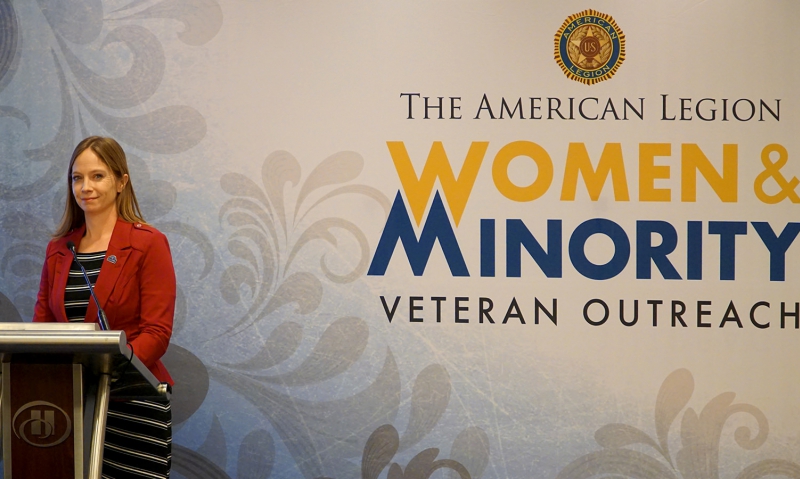
Attendees of The American Legion's Women Veterans Focus Group hear of resources, benefits available to support military sexual trauma victims.
Sexual harassment was a “chronic, if low-level,” part of Kayla Williams’ military experience. When she addressed the issue with her fellow Army servicemembers, Williams said their reaction was more upsetting than the harassment itself. They told Williams that she should have expected it upon joining the military and that she “shouldn’t complain because I didn’t want to ruin some man’s career. It made me feel isolated and alone. And that kept me from filing complaints. So that guilt over my silence is actually part of the burden that I bear today.”
Williams’ personal experience led her to become an advocate for military sexual trauma (MST) victims – she currently serves as VA’s director of the Center for Women Veterans, which monitors and coordinates VA health care, benefits, services and programs for women veterans, and advocates for women veterans' recognition. Williams, along with Amy Odom, director of litigation for the National Veterans Legal Services Program, shared with attendees of The American Legion’s Women Veterans Focus Group on Tuesday in Washington, D.C., how their organizations are supporting those who have experienced MST.
The focus group, held in conjunction with the Legion’s annual Washington Conference, was formed in response to the Legion’s Women’s Veteran Quality of Life Survey conducted last year. Of the more than 4,600 participants, 60 percent responded that they experienced some form of military sexual trauma, while 50 percent indicated that they did not report the incident.
VA recognizes that many survivors of sexual trauma did not disclose their MST experiences during service; thus, Williams said, it’s VA’s policy that all veterans seen for health care are screened for MST. In fiscal 2015, she said more than 99,000 female veterans and 63,000 male veterans who were seen for health care at a VA facility had reported a history of MST when screened by their VA health-care provider. The screenings are “a really important way to ensure that veterans are aware of and offered the free MST-related care available through the Veterans Health Administration. Service connection is not required to receive the care,” Williams said.
Williams shared that every VA health-care system has MST-related outpatient services available to both men and women, such as individual and group psychotherapy, as well as a designated MST coordinator that helps veterans access MST services and programs. Some of the more intenstive programs include residential ones that target rehabilitation, recovery, health maintenance, community integration and more.
VA’s website focusing specifically on MST services and benefits is www.mentalhealth.va.gov/msthome.asp. The Center for Women Veterans website, www.va.gov/womenvet, focuses on all women veterans issues and provides links to outside MST resources.
Although the Legion’s survey results are “really mind blowing and really disturbing,” said Odom, she has seen a transformation of people at the government, advocacy, community and veteran levels becoming more comfortable talking about MST than they were eight years ago. Williams has also seen the willingness of people discussing MST as more veterans are utilizing the available resources. To this effect, VA has been doing a lot to address this issue by making improvements with MST benefits claims.
In 2012, Odom, whose organization takes cases denied by the Board of Veterans Appeals to the veterans court, saw a lot of MST cases come across her desk because of denials. Now she only sees about one denial a year. And she mentioned that VA has reached out to MST victims who were previously denied VA disability compensation benefits and are offering to take a look at their denied claim.
Williams reminded attendees that veterans are not granted compensation for the traumatic event itself; they can be granted disability compensation for conditions that result from MST, and the most common one is post-traumatic stress disorder. As with any benefits claim, a veteran has to prove they have a current disability, that there was something that happened to them in service, and that their in-service incident has caused or is related to the problem they have. Odom said a challenge with filing an MST benefits claim is that MST is often hard to prove because it’s not reported.
When filing an MST benefits claim with an accredited service officer, Williams listed several pieces of evidence that can be used to support the claim – Department of Defense forms for reporting the incident; records from mental health counseling centers or crisis centers; pregnancy tests or tests for sexually transmitted diseases; statements from family members; deterioration of work performance; request to transfer duty stations; substance abuse; and episodes of panic attacks or depression that can’t otherwise be explained.
And it’s never too late to receive help. “Don’t think just because (MST) happened so many years ago that the VA isn’t going to believe you,” Odom said. “There are ways to prove it.” Odom recently worked with a woman who served in the ‘50s and is still suffering from the effects of MST; she was able to get service-connected and receive disability compensation.
“At one time to even mutter the word military sexual trauma, or to say that you’ve been a victim, was almost like a death sentence. People said there’s something wrong with that person,” said Verna Jones, executive director of the Legion’s Washington office. “We then became the villains instead of the victims. And now we know that if we suffer from military sexual trauma that we are not victims anymore, we are survivors.”
- Washington Conference

